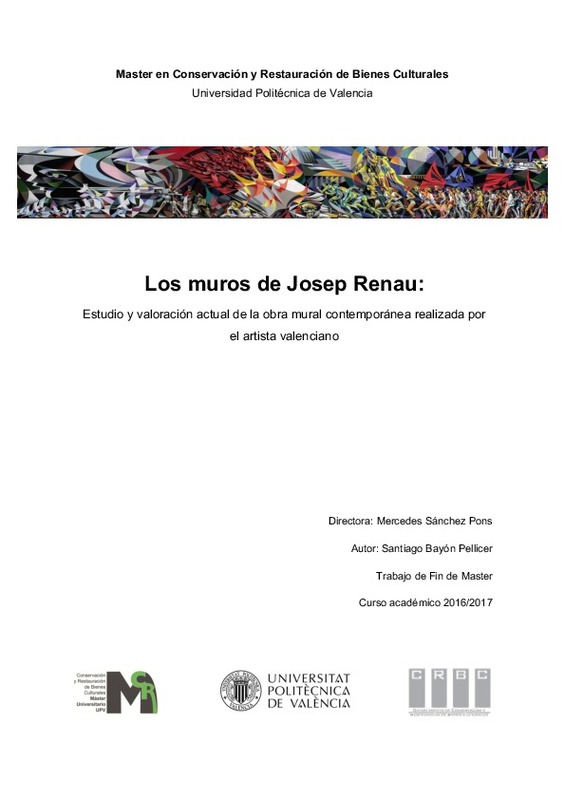|
Resumen:
|
[ES] Este trabajo final de grado se centra en el estudio de las pinturas murales de la Capilla del Ecce Homo de la Iglesia de Sant Francesc en Benigànim (Valencia). La iglesia forma parte del conjunto patrimonial del ...[+]
[ES] Este trabajo final de grado se centra en el estudio de las pinturas murales de la Capilla del Ecce Homo de la Iglesia de Sant Francesc en Benigànim (Valencia). La iglesia forma parte del conjunto patrimonial del Convento de Sant Francesc y es considerada origen del convento, que data de 1575. La iglesia primigenia contaba con una sola nave y capillas laterales, pero la remodelación llevada a cabo en el siglo XVIII supuso la ampliación a dos naves. En el cabecero de esta segunda nave se encuentra la capilla del Ecce-Homo, ornamentada casi por completo con pinturas murales de finales del siglo XVIII con temática relacionada con la Pasión de Cristo y sin atribución.
Tras sufrir la iglesia años de degradación y abandono, en el año 2012 se acometió una primera fase de restauración de las pinturas de la bóveda y pechinas de la Capilla del Ecce-Homo, quedando por completar en una segunda fase los paramentos inferiores y pilastras que dan acceso a la capilla. Este trabajo pretende profundizar en los aspectos técnicos y artísticos de este conjunto mural en general y en concreto en el de las dos escenas de los paramentos laterales (La Pasión, en el lado de la epístola, y el Lavatorio de pies, en el del evangelio). La escena de la Pasión está más completa que la del Lavatorio, que está prácticamente perdida, pero la primera presenta grafitis incisos en la práctica totalidad de su superficie.
El análisis de la técnica pictórica y los materiales empleados es una parte clave para la evaluación y diagnóstico del actual estado de conservación del conjunto mural. Se analiza la técnica de ejecución pictórica, con identificación de los principales componentes de esta obra mural, de los estratos preparatorios y la capa pictórica, y sus posibles similitudes y relación con otras obras murales.
En este trabajo se establecerán las causas de los daños y deterioros que presentan las pinturas e incluye la realización de una completa documentación gráfica y fotográfica, con la elaboración de mapas de daños de las pinturas.
[-]
[EN] This final thesis focuses on the study of the mural paintings of the Ecce Homo Chapel of the Church of Sant Francesc in Benigànim (Valencia). The church is part of the patrimonial complex of the Convent of Sant Francesc ...[+]
[EN] This final thesis focuses on the study of the mural paintings of the Ecce Homo Chapel of the Church of Sant Francesc in Benigànim (Valencia). The church is part of the patrimonial complex of the Convent of Sant Francesc and is considered the origin of the convent, dating from 1575. The original church had a single nave and side chapels, but the remodeling carried out in the 18th century meant the enlargement to two naves. At the head of this second nave is the Ecce-Homo chapel, almost completely ornamented with mural paintings from the end of the 18th century with themes related to the Passion of Christ and without attribution.
After the church suffered years of degradation and neglect, in 2012 a first phase of restoration of the paintings of the vault and pendentives of the Ecce-Homo Chapel was undertaken, remaining to be completed in a second phase the lower walls and pilasters that give access to the chapel. This work intends to deepen in the technical and artistic aspects of this mural group in general and specifically in the two scenes of the lateral walls (The Passion, on the Epistle side, and the Washing of the feet, on the Gospel side). The scene of the Passion is more complete than that of the Lavatory, which is practically lost, but the former presents incised graffiti on almost all of its surface.
The analysis of the pictorial technique and the materials used is a key part for the evaluation and diagnosis of the current state of conservation of the mural group. The pictorial execution technique is analyzed, with the identification of the main components of this mural work, the preparatory layers and the pictorial layer, and its possible similarities and relationship with other mural works.
This work will establish the causes of the damage and deterioration of the paintings.
This study includes the realization of a complete graphic and photographic documentation, with the elaboration of damage maps of the paintings.
[-]
|




![[Cerrado]](/themes/UPV/images/candado.png)




